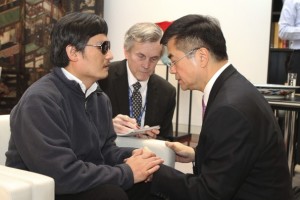America’s outdated view of China
By Perry Link
The Washington Post

U.S. acceptance of the China = “Communist Party leadership” formula dates from the Nixon-Mao breakthrough. In the early 1970s, the regime’s rulers were indeed the only Chinese whom Americans could reasonably approach. But to persist with such a constricted understanding today is obtuse, even dangerous.
The Obama administration has signaled that it wants to pull free. When President Obama visited Shanghai in 2009, he probably knew that his “town meeting” was packed with pre-selected party people. But he asked that some questions come from the Internet, and some of those queries — including on Internet censorship — were obviously not party-approved.
During the recent crisis over Chen, Obama said that “we want China to be strong [and] want it to be prosperous.” Days later Secretary of State Hillary Clinton echoed with “we want a strong and prosperous China.” Here the word “China” was adroitly ambiguous. To Americans, and to many Chinese, it could mean the United States wishes the best for “all the Chinese people.” But to Communist Party leaders, given the way they have used the term for decades, the message could be: “The American president favors wealth and power for the Communist Party-state.” That was the interpretation projected in China’s government-run media.
Allowing “China” to mean only a small elite is dangerous in that it adumbrates nearly a fifth of the world’s population. It also prevents a square consideration of how long the regime will last — by far the most sensitive topic in the diplomatic language game. One cannot raise it; it is an affront to “the other side” even to think it (though Chinese elites, who consistently send their money and children abroad, seem to think about it themselves). And the question persists: If “China” means only “the regime,” what happens, some day, if it is not there?
The two dynasties in Chinese history that most resemble the Communist episode are the Qin (221-207 B.C.) and the Sui (A.D. 589-618). Both oversaw huge new construction and great increases in wealth but also ruthless tyranny, deaths from forced labor, and horrors such as burning of books and burying of scholars (the “dissidents” of another era). Both were well short. China will eventually outgrow its current spasm as well, perhaps without Chen Guangcheng’s help. On the other hand, maybe this artist of miracle escapes can pull off a second miracle: changing the way the U.S. government understands “China.”
_________________________
”Perry Link, who was a co-editor of “The Tiananmen Papers,” teaches comparative literature and foreign languages at the University of California, Riverside.
To read the article on The Washington Post website (where there is a photo gallery), click here.
